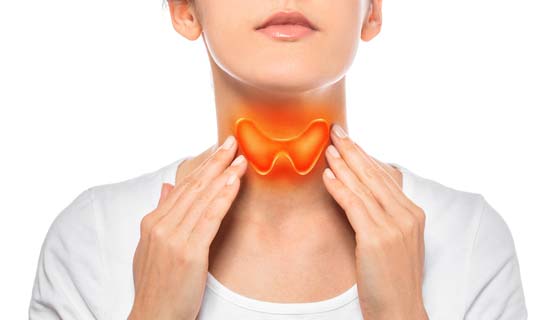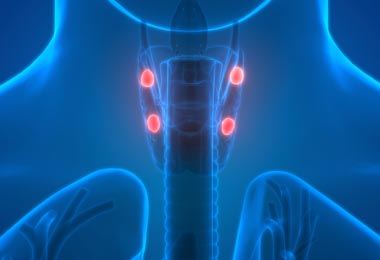Hypoparathyroidism
What is hypoparathyroidism?
Hypoparathyroidism occurs when 1 or more of your parathyroid glands are underactive. You have 4 of these tiny glands. Each one is about the size of a grain of rice. They are found in your neck, next to the thyroid gland. They keep the amount of calcium in your blood in a normal range. They also keep the levels of magnesium and phosphorus normal. If these glands are underactive, they do not make enough parathyroid hormone (PTH). This lowers the level of calcium in your blood.What causes hypoparathyroidism?
The most common cause is injury to or removal of all 4 parathyroid glands. That can accidentally happen during surgery to remove the thyroid. Some people are born without these glands. Or the glands do not work as well for unknown reasons.What are symptoms of hypoparathyroidism?
Symptoms are different for each person. These are the most common ones:
- Uncontrollable, painful spasms of your face, hands, arms, and feet
- A burning or prickling feeling (pins and needles) in your hands and feet, and around your mouth
These symptoms may look like other health problems. Always see your healthcare provider for a diagnosis.
How is hypoparathyroidism diagnosed?
Your healthcare provider will ask about your past health. You will also need a physical exam. Blood tests can also measure your calcium and parathyroid hormone levels. You may need other tests.How is hypoparathyroidism treated?
Your health care provider will figure out the best treatment for you based on:
- How old you are
- Your overall health and past health
- How sick you are
- How well you can handle specific medicines, procedures, or therapies
- How long the condition is expected to last
- Your opinion or preference
An IV (intravenous) infusion of calcium may be able to ease your symptoms right away. You may also need to take calcium and vitamin D pills every day.
When should I call my healthcare provider?
Tell your healthcare provider if your symptoms get worse. Also call your provider if you have new symptoms.Key points about hypoparathyroidism
- Hypoparathyroidism happens when 1 or more of your parathyroid glands are not active enough. They don’t make enough parathyroid hormone. This lowers the level of calcium in your blood.
- The most common cause is injury to or removal of all 4 parathyroid glands. That can accidentally happen during surgery to remove the thyroid.
- Symptoms may include painful spasms of your face, hands, arms, and feet. They may also include a burning or prickling feeling in your hands and feet, and around your mouth.
- Blood tests can spot low levels of calcium and parathyroid hormones.
- An IV (intravenous) infusion of calcium may be able to ease your symptoms right away. You may also need to take calcium and vitamin D pills every day.
Next steps
Tips to help you get the most from a visit to your healthcare provider:
- Know the reason for your visit and what you want to happen.
- Before your visit, write down questions you want answered.
- Bring someone with you to help you ask questions and remember what your provider tells you.
- At the visit, write down the name of a new diagnosis, and any new medicines, treatments, or tests. Also write down any new instructions your provider gives you.
- Know why a new medicine or treatment is prescribed, and how it will help you. Also know what the side effects are.
- Ask if your condition can be treated in other ways.
- Know why a test or procedure is recommended and what the results could mean.
- Know what to expect if you do not take the medicine or have the test or procedure.
- If you have a follow-up appointment, write down the date, time, and purpose for that visit.
- Know how you can contact your provider if you have questions.





